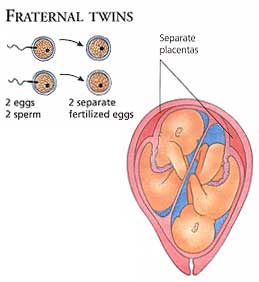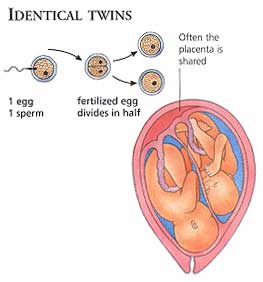Have you ever wondered what it’s like to be a twin? If you’re like most people, then the answer is probably yes. Well, lucky for you, I am a twin and am here to tell you all about the good, the bad, and the ugly it entails. Each week will bring another cool fact you probably didn’t know about twins. Some of it may surprise you.
When I tell people I’m a twin, the response is usually, “Wow, how cool!” Which I guess makes sense because the chance of being born a twin, a fraternal twin that is, is 1 in 90. This can increase to the chance of 1 in 35 with the use of fertility drugs. However, I’m an identical twin, which is even more rare since the chance of this happening is only 1 in 250. So I guess it is kind of cool that I’m a part of that small percentage in those odds.
Ok, so quick lesson: I will break down the differences between fraternal and identical twins for you. Fraternal twins are genetically as similar as siblings. This is because they are fertilized as two separate eggs in the mother’s womb.
That means they’ll only look as alike as regular siblings and could even be different genders. Fraternal twins are also the only kind of twins that are hereditary and genetically-based. The chances of having them can be increased with fertility treatment. The chances can also be increased the older you get (the odds of a mother over 50 having fraternal twins is 1 in 9), the more you weigh, the taller you are, if you’re African American as compared to white, and if you’ve had fraternal twins before.
On the other hand, identical twins were once the same egg. Some freak chance caused it to split and wa-lah! You’ve got two babies. No one seems to know why this happens, but Pamela Prindle Fierro, a Twins and Multiples expert, describes it as a “malfunction of the normal development process.”
Since it is completely random, the chances of having them does not increase with the use of any drugs, and since the two babies were once one egg, they share 100% of the same DNA. Therefore, identical twins will always be the same gender. However, one very important thing to know is that, even with shared DNA, they always look and act differently in one way or another. I’ll describe why this is in a later blog.
So, the above is true for me. I’m an identical twin and for my parents, this news was quite the shock. We make fun of my sister, Megan, and call her the “bonus baby” because she was born second (which means yes, I’m older, by five minutes if you want to know the details, and you wouldn’t believe how many people ask us this question). There’s a lot of misconceptions going around about twins and I’m here to try and make things straight. So now that I’ve described the differences between identical and fraternal, I’ve got the ball rolling, so stay tuned for the inside scoop on some interesting facts about twins!






I, like you mentioned earlier always thought it would be awesome to be a twin. Especially an identical twin. I don’t know anything about it but I always wanted a sister and having a sister the exact same age as you would be so cool. It would be nice to have a friend all the time. I think it would be hard to share everything too though. It would be hard to share everything though. Like all your big moments. Its nice to have things be all about you every once and a while.
How awesome! I’m so excited to read your blog because you had me hooked and then it was over, so I’m definitely glad I get to keep reading. You must get a lot of different reactions about being a twin and I’m sure there are a lot of questions, too. I also really like how you incorporated the biology (mainly because I love science-y things like this) and your personal story too.